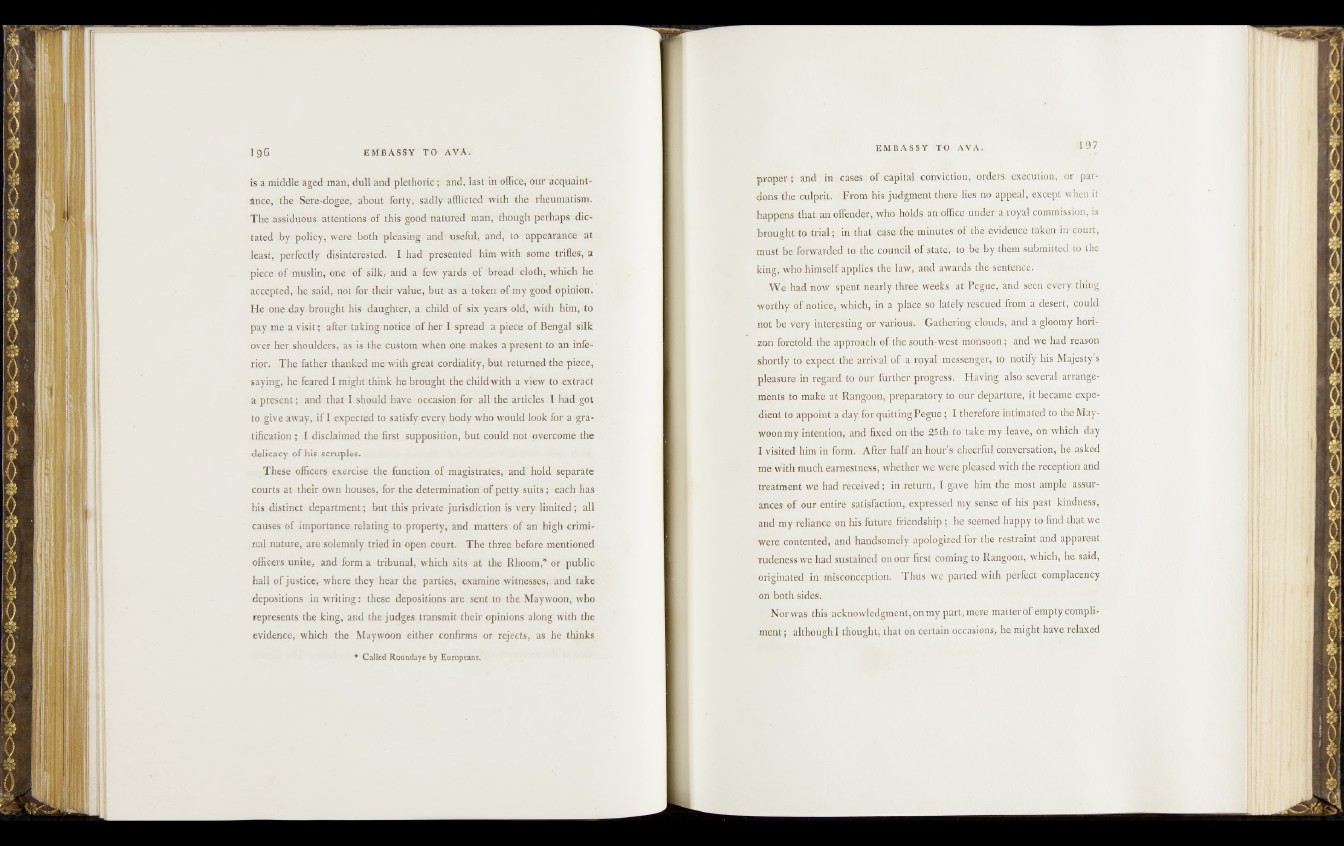
is a middle last In office, acquaintance,
the-<Sere-'dogee; about forty,- sadly afflicted withlth©! rheumatism.
Thfe SSSiduGUs: ^attentions -of this gbod'nalurcd man TM&itgh >peft^spdic-
tated by policy, were b o th -pM si)^ and ^useful, aridf'to appearance at
least; pferfetetiy disinterested. I had presented him with some trifles, a
-piece';pfMn^in^ o n e ^ f''Sift, and a few yards of • bibadr blotih ^Which; he
accepted, he said, not for their'value, but as a token of iny good opinion,
f ie one day brought his daughter, a child of six years old, with him, to
pay me a.visit; after taking, notice of her-I spread a piece of Bengal silk
over, her shoulders, as is the custom when one makes a present to an inferior.
The father thanked meewith great cordiality, but.returaed the piece,
saying, he feared I might think he brought the child with a viewJto .extract
a.present; and that I shouldhave occasion for aIl the artic-l'es^f ha®gSt
toigive away, if I expected to satisfy every body who .would locjldfbrta; gratification
; I disclaimed the first supposition, but could not'-pverednie the
delicacy o f his scruples—
. .-Thesei officers exercise the function of magistrates, alnd-liald separate
courts^ at their own houses, for the determination o f petty^suit-k;-each-has
his distinct department; but this private jurisdiction is very^limitedf. all
causes of importance relating to property, and matters of an .highictdfftif-
nal nature, are solemnly tried in open court. The three before mentioned
officers unite, and form a tribunal, which sits at the Rhoom,* o r public
hall o f justice; where they hear the parties, examine witnesses,*, and take
depositions in writing.: these depositions are sent to the Mayfaodn; who
represents the king, and the judges transmit their opimons-atong. with the
evidence, which the Maywoon either confirms or rejects, as he thinks
* Called Roundaye by Europeans. .
proper £ and in#easesf? of capital» CQtifMfftons ^©Kderscex-ecution,'' or pardons
‘the- cdp»te«(Mjwin. hi»p»dgnmM&e*e; fo,frO'.^f>ea],t except when it
■(happens that an o f f e n d e r 3aajf0ffi.de .^Cjferiatuoyal commission, is
•brought» to trial; inf that'casesi^rim.inhtes,J^r|h,®Seyi%r}ee<,jSaken imeouiit,
must bbfaftwarded fo then ognfd of !stafc#id;b^by'theih sdbmiWed;.t0 the
king, wnfehSnself'^>pli®fethe law;« find awards’’
\ \ c had now spent neuly thice weeks at IVgue/uul seen 1 \ ef wafting,
w01 thy SlnoLfcc, which?.in a place so la id , usducddioiit edcscift coufil
not be very intes^sung 01 \«ai i o u ^ f e uli’ci ing hlbfAlsV and irgloomp horizon
foretold' t!u>approve h> o( tlicynuJ? cstfifigifisonn. uni wntfh id 1 c isoti
ahnitly 10.expect fherfirns^(iljiffi^wIjiuoss^^J^tb* notiiw*! l'ihNfiii.sn'S!
pleasuie in legald to-oui hh theiVl>«§?rcss TI lu n g ’dlsof-sci cr tf irian„e
•ipents to make at Rhiigoon,'ipreparatory toionr d c p a ilu r e ,b e e hhe i\p c -
dieut to appoint a day, lor quitting Peg ic , afthci’cldi eftntiftiatJel to-ihc'Mav
jvoonmy;intention,nand fixed oh the S&d^biftake my^fdase. on whiih. day
Ihyisited hinithTcffnrt A fter J ^ r ^ S h h ^ ’f^sheerffiKdohvdrs^iSh; -he asked
me with m uih earnestness, whether we'were ploasuhwith tluSrcception’and
treatment we, had received;., insiretiim, I g’afce him tlte-mosti am^ifir assurances,
(il our.entire satisfaction, JxpicsstdMuy sc'rrfc'oi lus. past kindness1,
and my leliance on his future friendship: he,seemed happy to-hml tint we
•%ere contented, and handsomely apologized for< tfi^ restraint and apparent
Tudenesswehad sustained ononr first coming to Jlangoon,. which, he saufy
Originated in misconception. Thus we parted*,with perfect; complacency
on both sides'.
Nor was this acknowledgment,bjtolippairfc, mere mattf 1 ol empty compliment
; although I thought, that on certain occasions, he migbChuV'ey claxed